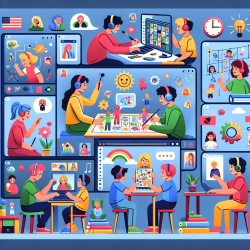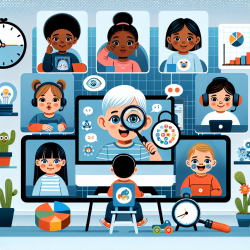The COVID-19 pandemic has necessitated the rapid adoption of online psychological therapy, particularly for children. The study "Online psychological therapy for kids during social distancing: A study case in a Brazilian clinical setting" by Campos and Varanda (2021) provides critical insights that can help practitioners enhance their skills and improve outcomes for their young clients. This blog will delve into the findings of this study and offer practical advice for implementing these strategies in your own practice.
Key Findings from the Study
The study focused on two children aged 6 to 11 who participated in psychological sessions via video calls. The primary objective was to evaluate whether online therapy could effectively support therapeutic play tools and maintain a proper therapeutic setting. Here are some of the key findings:
- Family Cooperation: The cooperation of the family was fundamental for creating and maintaining an adequate therapeutic setting. Families provided a silent and private room for the sessions.
- Use of Conventional and Electronic Games: The children were free to choose toys available at home, such as board games, comic and storybooks. Additionally, electronic games were used through screen sharing.
- Therapeutic Tools: Tools such as mimicry, drawing, and an adaptation of the Winnicott Squiggle Game were employed effectively in the virtual environment.
- Emotional Expression: Emotional conflicts were expressed through both conventional and electronic games, demonstrating that therapeutic play can be adapted to an online format.
- Therapeutic Alliance: The study concluded that it was possible to maintain a strong therapeutic alliance and carry on with the treatment effectively.
Implementing These Findings in Your Practice
Based on the findings from this study, here are some practical steps you can take to enhance your online therapy sessions:
- Engage Families: Ensure that families understand the importance of providing a quiet, private space for therapy sessions. Their cooperation is crucial for creating a conducive therapeutic environment.
- Offer Flexibility in Play Tools: Allow children to choose from a variety of play tools, both conventional and electronic. This flexibility can help them express their emotions more freely.
- Adapt Traditional Tools: Adapt traditional therapeutic tools, such as the Winnicott Squiggle Game, to the online format. Use screen sharing and other digital tools to facilitate these activities.
- Maintain a Strong Therapeutic Alliance: Focus on building and maintaining a strong therapeutic alliance. This can be achieved by being present, attentive, and responsive during sessions.
- Monitor Emotional Expression: Pay close attention to how children express their emotions through different types of play. Use this information to guide your therapeutic interventions.
Encouraging Further Research
While this study provides valuable insights, it is based on a small sample size. Further research is needed to generalize these findings to a broader population. As practitioners, we should encourage and participate in research that explores the efficacy of online therapy for children. This will help us continually improve our practices and provide the best possible outcomes for our clients.
To read the original research paper, please follow this link: Online psychological therapy for kids during social distancing: A study case in a brazilian clinical setting.










